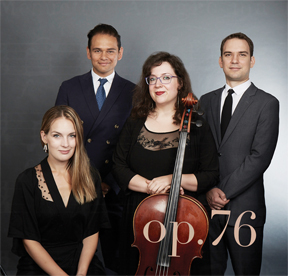
Kansas City’s Opus 76 Quartet will perform a new rendition of the renowned “Kol Nidre” by German composer Max Bruch at 6:30 p.m. on Shabbat Shuvah, Friday, Oct. 4, at Congregation Beth Torah.
Beth Torah’s Rabbi Javier Cattapan said the composition is meaningful this time of year.
“Hearing it during the 10 days of Shuvah (Repentance) can help us prepare for Yom Kippur at a different level because music touches us emotionally,” he said. “As part of my own preparations for the High Holy Days, I listen to choral and cantorial music for Rosh Hashanah and Yom Kippur; it helps me ‘get in the mood’ for this time of the year.”
He said on the night of the performance the musicians will explain what makes this version of the piece unique, but “the music will speak for itself.”
Opus 76 Quartet is comprised of Keith Stanfield and Zsolt Eder on violins, Ashley Stanfield on viola and Sascha Groschang on cello. This will be the first performance of “Kol Nidre” by a quartet.
Although originally written in 1880 for cello and orchestra, “Kol Nidre” is traditionally performed in synagogues around the world as a cello solo on Erev Yom Kippur at the Kol Nidre service. Keith Stanfield commissioned at his own expense a string quartet arrangement of the orchestral version, which preserves the solo cello parts.
“It has been arranged for a number of different instrumental combinations, but it has never been arranged for a quartet ever and religious music is very important to us,” said Stanfield. “Music is the highest form of communication and the great thing about music is that it transcends any cultural barrier, language or even thoughts. It goes right to the heart and enables people to communicate without any barriers.
“This ‘Kol Nidre’ by Bruch is a rich, wonderful piece and I just wanted to be able to have a version of it on offer to the Jewish community so that their Days of Awe could be, in a very humble way, perhaps enhanced or slightly enriched, because I know that a lot of synagogues will have a cellist by themselves come and play this very piece,” he continued.
Stanfield is not a Jew, but said the Jewish community helped him in a very personal way. His mother is from Western Samar, a small Pacific island, and his father is Australian. Stanfield grew up in London with no relatives or family.
“I come from a very non-traditional classical music background. I started the violin when I was 3 and there were a couple of people who were Jewish who really did help my early career, so I’ve always felt a keen secret debt of gratitude to the Jewish people and I’ve always bore that in mind,” he explained. “My skill, or my calling or my ability, is to perform and play the violin and for a while I’ve been looking for a way to give back to the Jewish community in a way that they helped me personally.”
As concertmaster for the Kinnor Philharmonic, Stanfield said he already has that Jewish connection. He enjoys the position and feels lucky to have it, but seeks ways to do more for the Jewish community.
“I’ve always wanted to do something, and continue to do things, for the Jewish community that respect and celebrate their holy days. This has been an ambition of mine and I’ve just come into a position recently to be able to do something. So I hope it works out well,” he said. “This piece of music is very dear to a very noble and admirable community of people and that’s why I think it’s special. My reaction to it is that it means so much to people who have helped me throughout my whole life.”
Some say Bruch, who was Protestant, composed “Kol Nidre” specifically for the Jewish community of Liverpool, England, when he took up his post as principal conductor of the Liverpool Philharmonic Orchestra. He was inspired by two traditional Hebrew melodies — the first from the traditional Jewish service on the night of Yom Kippur; the second an extract from a musical setting of the Lord Byron poem, “Those that Wept on Babel’s Stream.”
Others say “Kol Nidre” was not meant for a sacred service, that Bruch himself viewed the melody as a folksong. Yet for more than 100 years it has been central to the most important day in a Jew’s life — Yom Kippur.
Stanfield said it is his understanding that Bruch did compose “Kol Nidre” as a sacred piece, although it was first performed in concert halls, not synagogues.
“He took this Jewish song and was very impressed by it; he revered the Jewish people and wanted to celebrate them and so aggrandized this sacred song by making it for orchestra and cello, and then an orchestra and violin version of it,” Stanfield said. “So I don’t think it was supposed to be secular.
“Anyone can have any response or reaction to any piece of music from the composer to the performer to the listener, and none of them are wrong. It’s always your interpretation of whatever you’re listening to or playing or thinking of. There is a current fallacy in music that the composer is the emperor and we all just have to live in their universe, and it’s actually not true at all.”
Rabbi Cattapan said he looks forward to hearing the piece performed at Beth Torah because there is nothing like live music, with no amplification.
“Our worship services during the High Holy Days have plenty of words, including the rabbis’ messages and sermons, so this is an opportunity to come and listen to the traditional melody of ‘Kol Nidre’ arranged by Bruch, and experience it as a piece of sacred music. I’ll invite people to open up to the music and let it take your emotions where the music leads you,” he said.


